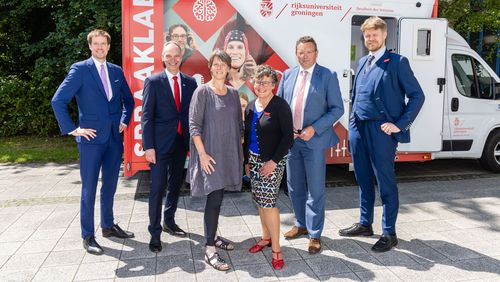Supervising doctoral students is a demanding task. The University Society Oldenburg (Universitätsgesellschaft Oldenburg – UGO) has created a new award to honour the commitment of supervisors. Annett Thiele, Vice President for Early Career Researchers and Equal Opportunities at the University of Oldenburg, explains the background to the award.
Professor Thiele, what is the goal of the new Award for Outstanding Doctoral Supervision?
The award, which will be presented for the first time this year, is intended to honour outstanding supervision and strong commitment to the promotion of early career researchers. It is driven by the desire to make guidelines for good supervision more visible. We also want to encourage discourse on suitable criteria for measuring outstanding doctoral supervision. We are very grateful that the UGO is supporting this initiative and has decided to confer such an award.
What makes the award so important in your view?
Doctorates, and especially the final phase of a doctorate, are often a very critical transition phase. For doctoral students, deciding what to do after their doctorate is often complicated by the fact that they are familiar with the conditions at the university, but not with the non-academic labour market and working life outside academia. This is where the new award comes in: the selection criteria include the extent to which supervisors encourage their doctoral students to network or attend international conferences, but also the stimulus they provide to their students to develop interdisciplinary competences and, if applicable, consider career opportunities outside the university at an early stage.
How are candidates for the award nominated?
Doctoral students who are in the final phase of their doctorate are eligible to put forward a candidate for the award. More specifically, they should be at least in the second year of their doctorate, because at that stage they will have had enough time to get to know their supervisor well. The doctoral student should then explain their experiences in a one to two-page personal statement, if possible giving concrete, detailed examples.
What are the focus areas?
Several areas are relevant for the selection process, such as individual support and communication, research praxis, and integration into the scientific community. It's not just about offering guidance in scientific work, but also about providing access to infrastructure, regular meetings, encouragement to publish research or a good atmosphere in the working group. The statements are forwarded anonymously to a four-member jury. The nominees don't know who recommended them for the award, and nor does the jury know who is behind the recommendations.
How often will the award be conferred, and in what context?
The UGO plans to present the award, which includes 2,000 euros in prize money, once a year. This year, it will probably be awarded at the end of November as part of the new UGO format, "The Sound of Science".




![[Translate to English:] Five people stand in front of the canteen and hold certificates in front of them.](/fileadmin/_processed/9/c/csm_013_uk_fairtrade_93be056bad.jpg)